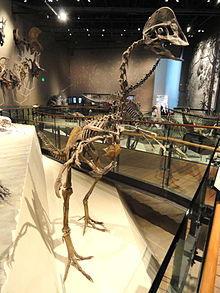Souvrství Kaiparowits

Souvrství Kaiparowits je významnou a paleontologicky bohatou geologickou formací na území jižního Utahu v USA.[1] Stáří sedimentů činí 76,6 až 74,5 milionu let (podle jiné studie 76,0 až 74,0 m. l.)[2], jedná se tedy o usazeniny z pozdní křídy (geologický stupeň kampán).[3] Výchozy souvrství se nacházejí na plošině Kaiparowits na území přírodní rezervace Grand Staircase-Escalante National Monument. Souvrství bylo formálně definováno roku 1931, většina paleontologického výzkumu však v něm probíhá až od roku 1982.[4]
Charakteristika
[editovat | editovat zdroj]Průměrná mocnost sedimentů v souvrství Kaiparowits je zhruba 790 metrů, místy přesahuje i 850 metrů. Z hornin zde převažuje jílovec a pískovec. Bylo zde objeveno množství druhů dinosaurů i jiných živočichů. Časově se doba ukládání těchto vrstev přibližně shoduje s geologickým souvrstvím Dinosaur Park v kanadské Albertě.[5] Kromě dinosaurů zde bylo objeveno také množství dalších plazů (želvy, krokodýli, ještěři), obojživelníci, ryby, paryby, savci a například i ichnofosilie a fosilní otisky kůže.[6]
V sedimentech tohoto souvrství byly objeveny také fosilie velkého ptakoještěra, který dosahoval v rozpětí křídel 4,3 až 5,9 metru.[7]
Početné jsou také fosilie vajec některých dinosaurů, například neznámých teropodů (oospécie Stillatuberoolithus storrsi).[8]
Dinosauří fauna
[editovat | editovat zdroj]
- Akainacephalus johnsoni[9]
- Kosmoceratops richardsoni[10]
- Nasutoceratops titusi
- Utahceratops gettyi[11]
- Gryposaurus monumentensis[12]
- Parasaurolophus cyrtocristatus[13]
- ?Parasaurolophus sp. nov.
- Hagryphus giganteus[14]
- ?Ornithomimus velox
- ?Paronychodon
- ?Richardoestesia
- Talos sampsoni[15]
- Teratophoneus curriei[16]
Odkazy
[editovat | editovat zdroj]Reference
[editovat | editovat zdroj]- ↑ SOCHA, Vladimír. Deset let společenského tyranosaurida. OSEL.cz [online]. 7. prosince 2021. Dostupné online. (česky)
- ↑ Roberts, E. M.; Deino, A. L.; Chan, M. A. (2005). "40Ar/39Ar age of the Kaiparowits Formation, southern Utah, and correlation of contemporaneous Campanian strata and vertebrate faunas along the margin of the Western Interior Basin". Cretaceous Research. 26 (2): 307–318. doi: 10.1016/j.cretres.2005.01.002
- ↑ Roberts E. M.; et al. (2013). The Kaiparowits Formation: a remarkable record of Late Cretaceous terrestrial environments, ecosystems and evolution in western North America. In: Titus A. L., Loewen M. A., editors. At the Top of the Grand Staircase: The Late Cretaceous of Southern Utah. Bloomington, Indiana: Indiana University Press; 2013. p. 85–106.
- ↑ Gregory, H. E.; Moore, R. C. (1931). The Kaiparowits region, a geographic and geologic reconnaissance of parts of Utah and Arizona: U.S. Geological Survey Professional Paper, 164, 161 p.
- ↑ Fowler, D. (2016). A new correlation of the Cretaceous formations of the Western Interior of the United States, I: Santonian-Maastrichtian formations and dinosaur biostratigraphy. Peer J Preprints.
- ↑ Eaton, Jeffrey G.; Cifelli, Richard L.; Hutchinson, J. Howard; Kirkland, James I.; Parrish, J. Michael (1999). "Cretaceous vertebrate faunas from the Kaiparowits Plateau, south-central Utah". In Gillete, David D. (ed.). Vertebrate Paleontology in Utah. Miscellaneous Publication 99-1. Salt Lake City: Utah Geological Survey. pp. 345–353. ISBN 978-1-55791-634-1.
- ↑ Andrew A. Farke (2021). A large pterosaur limb bone from the Kaiparowits Formation (late Campanian) of Grand Staircase-Escalante National Monument, Utah, USA. PeerJ. 9: e10766. doi: https://doi.org/10.7717/peerj.10766
- ↑ Sara E. Oser, Karen Chin, Joseph J. W. Sertich, David J. Varricchio, Seung Choi & Jeffrey Rifkin (2021). Tiny, ornamented eggs and eggshell from the Upper Cretaceous of Utah represent a new ootaxon with theropod affinities. Scientific Reports. 11, Article number: 10021. doi: https://doi.org/10.1038/s41598-021-89472-1
- ↑ Jelle P. Wiersma; Randall B. Irmis (2018). "A new southern Laramidian ankylosaurid, Akainacephalus johnsoni gen. et sp. nov., from the upper Campanian Kaiparowits Formation of southern Utah, USA". PeerJ. 6: e5016. doi: 10.7717/peerj.5016
- ↑ Scott D. Sampson, Mark A. Loewen, Andrew A. Farke, Eric M. Roberts, Catherine A. Forster, Joshua A. Smith, Alan L. Titus (2010). "New Horned Dinosaurs from Utah Provide Evidence for Intracontinental Dinosaur Endemism". PLoS ONE. 5 (9): e12292.
- ↑ SOCHA, Vladimír. Rohatá tvář z Utahu. OSEL.cz [online]. 14. ledna 2019. Dostupné online. (česky)
- ↑ Glut, Donald F. (1997). "Gryposaurus". Dinosaurs: The Encyclopedia. Jefferson, North Carolina: McFarland & Co. pp. 445–448. ISBN 0-89950-917-7.
- ↑ Parks, William A. (1922). "Parasaurolophus walkeri, a new genus and species of crested trachodont dinosaur". University of Toronto Studies, Geology Series. 13: 1–32.
- ↑ Zanno, L. E.; Sampson, S. D. (2005). "A new oviraptorosaur (Theropoda; Maniraptora) from the Late Cretaceous (Campanian) of Utah". Journal of Vertebrate Paleontology. 25 (4): 897–904. doi:10.1671/0272-4634(2005)025[0897:anotmf]2.0.co;2
- ↑ Lindsay E. Zanno, David J. Varricchio, Patrick M. O'Connor, Alan L. Titus and Michael J. Knell (2011). "A new troodontid theropod, Talos sampsoni gen. et sp. nov., from the Upper Cretaceous Western Interior Basin of North America". PLoS ONE. 9 (6): e24487. doi: 10.1371/journal.pone.0024487
- ↑ SOCHA, Vladimír. Obludný zabiják z Utahu. OSEL.cz [online]. 25. května 2020. Dostupné online. (česky)
Literatura
[editovat | editovat zdroj]- Weishampel, David B; et al. (2004). "Dinosaur distribution (Late Cretaceous, North America)." In: Weishampel, David B.; Dodson, Peter; and Osmólska, Halszka (eds.): The Dinosauria, 2nd Edition. Berkeley: University of California Press. Pp. 574-588. ISBN 0-520-24209-2.
- Ashley L. Ferguson & Leif Tapanila (2022). Rare clutch of Cretaceous turtle eggs preserved in the Kaiparowits Formation of southern Utah. Cretaceous Research. 105197. doi: https://doi.org/10.1016/j.cretres.2022.105197
Externí odkazy
[editovat | editovat zdroj]- O souvrství Kaiparowits na webu USGS (anglicky)
- SOCHA, Vladimír. Rohatá tvář z Utahu. OSEL.cz [online]. 14. ledna 2019. Dostupné online. (česky)